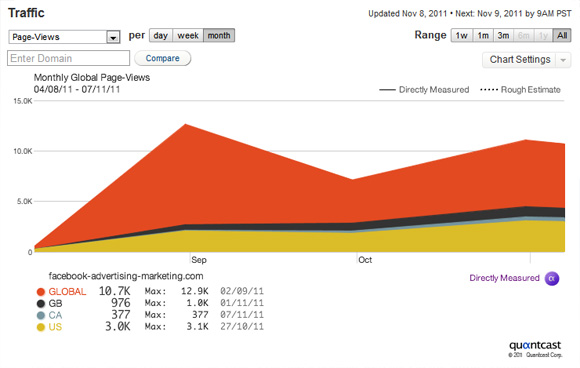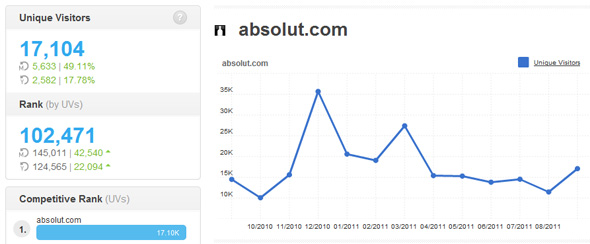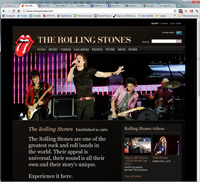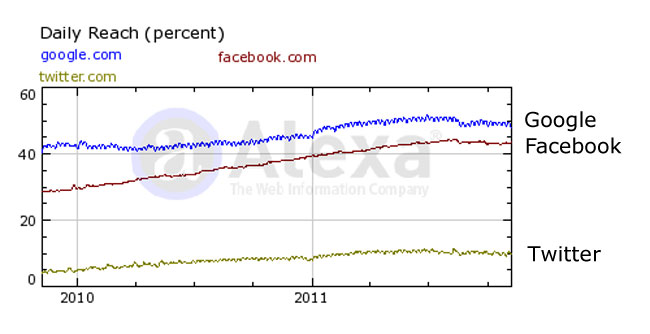Websites have become an important marketing platform for modern marketers and online advertising is becoming increasingly popular for companies. You might be a marketing manager looking for websites where to place your banner ads, or an SEO expert looking for blogs and forums where to write comments with your inbound links. Or, you might be a blogger trying to figure out if it’s worth your time to write a guest post on a certain blog.
As a marketer you don’t really want to pay for banner ads on a website that has no traffic or reach. Sometimes website owners give you traffic data from their Google Analytics, but there is no way you can be certain that those facts reflect the truth.
– You are better off doing the research yourself.
Luckily you don’t have to be Einstein to do that; but those guys who developed these methods sure came close! Especially Larry Page who calculated the formula for the Google Page Rank algorithm.
How do you find out which website is better than the other?
As there are millions and millions of websites not all of them were created equal. Some are more useful for marketing purposes than the others. Some have thousands of daily visitors, and some have just a few. Luckily there are a few clever tools we can use to separate the good from the ‘notsogood’.
How To Evaluate A Website For Marketing Purposes
Several companies gather information about websites and publish them freely. Companies such as Alexa, Quantcast, Compete and Google collect vast amounts of information we can use for evaluating websites for marketing and PR initiatives. I will cover these in more detail:
Alexa – The Web Information Company
Alexa has been around since 1996 providing us free, global web metrics data. Alexa was founded by Brewster Kahle and Bruce Gilliat in San Francisco and later acquired by Amazon for $250 million in 1999. The company’s somewhat strange name was actually chosen after the Library of Alexandria in ancient Egypt.
Alexa is mainly used for evaluating global traffic on websites and blogs. You can search the Alexa database by keywords, categories or countries. Alexa puts the websites in order of relative importance by their one month Alexa Traffic Rank. This monthly rank is calculated using a combination of average daily visitors and page views over the past month. The site with the highest combination of visitors and page views wins and gets ranked at No. 1.
Alexa website lists the Top 500 Websites in the world at any given time. Most often Google is No. 1 and Facebook No. 2 but sometimes they swop places. See a related post of the Top 20 Most Popular Websites In The World.
Alexa provides competitive analysis, benchmarking and market research. Alexa also gives you a handy option to compare up to 5 websites in relation to their traffic data.
Below is a comparative chart of Google, Facebook and Twitter according to their Alexa Traffic Rank:
It is recommended to concentrate on websites and blogs which have better than 300,000 Alexa Traffic Rank. The lower the number the better the website is – Twitter is No. 9 for instance. If a website is in the top 100K you can be sure it has plenty of traffic and it would be well suitable for any marketing efforts you might have in mind.
You can also register your own websites or blogs with Alexa. As a registered user you can control the information about your sites as well as get additional info. Basic registration is free.
Google Page Rank
Google Page Rank is a link analysis algorithm used by the Google search engine. The name ‘Page Rank’ does not actually indicate ranking of a web ‘page’ but rather the name of its inventor Larry Page (co-founder of Google with Sergey Brin). Page Rank is a trademark of Google Inc. but the Page Rank -process itself has been patented to Stanford University. Google has exclusive license rights on the patent from the university. Stanford received 1.8 million Google shares in exchange for the use of the patent and later sold them for $336 million. Nice…
Page Rank algorithm assigns a numerical weight (0-10) to each element of a hyperlinked set of documents (website) with the purpose of measuring its relative importance. The rank value indicates an importance of a particular web page. The higher the value the better.
A hyper link to a web page counts as a ‘vote’ of support. The Page Rank of a page is defined recursively and depends on the number of all other web pages linking to it. These are called inbound, or incoming links. A page that is linked to by many other pages with high Google Page Rank receives a high rank itself. [deciphered from Wikipedia tech jargon]
Ok, enough of that scientific stuff.
In short, Google Page Rank is a simple figure to determine the importance of a website. Zero is bad, ten is unbelievable good and almost unattainable by normal websites. Even Facebook and Twitter have only 9 Page Rank!
From the marketing point of view you should ignore all websites with a Google Page Rank of 0, 1 and 2. Starting from 3 they are usually good enough for spending some quality time with. In some occasions you can still go with a Page Rank 2 website provided that it has a good Alexa (or some other) traffic rank.
Here is a nifty little tool to check out the Google Page Rank of any website or blog: http://www.prchecker.info/check_page_rank.php
Quantcast
Quantcast was founded in 2006 by Konrad Feldman and Paul Sutter in California. Quantcast collects real time information about websites and their visitors to marketers. Quantcast measures over 25 million web audiences around the world and more than 300 billion Internet media consumption events each month. Quantcast keeps a list of Top 1,000.000 Websites ranking them by their traffic.
Quantcast provides a free audience measurement service with detailed visitor information and audience insights. The data includes measured and estimated website traffic, demographic and geographic information, business activity, site affinity and audience likes and interests.
Quantcast gives you nice visual reports; for instance this Quantcast data report shows a range of 7.000 to 12.000 monthly page views for this blog you are reading right now.

(I must remember update that figure to the ‘Advertise Here‘ section.)
From my Quantcast report I can also see that 59% of my readers are male, 62% have no kids and 70% went to college or grad. school. Also my visitors are interested in science, nature, technology, politics and photo/video sharing among other things. Very interesting and important information, won’t you say?
Not all websites are measured by Quantcast. You will have to apply to get measured. This is why Quantcast is a good metric as a web master must create an account with Quantcast and insert their special code onto their site. You just wouldn’t do that if your website performance was crap, would you?
Quantcast measurements are calculated per target country so they are all different depending on where the audience lives. As a rough guide for US you might be happy with a website that is in the top 1 million but for UK it should be in the top 10,000 to make an impact.
Compete
Compete.com is a Boston based web traffic analysis service launched in 2000 by Bill Gross. Compete publishes website profiles, search and referral analytics as well as the approximate number of visitors to the top 1 million websites in the world.
The Compete scores are computed from different sources such as internet service providers, opt-in panels, application providers and users of the Compete toolbar. The data comes from clickstream behaviours and opt-in survey responses of 2 million consumers across the United States.
Compete counts visitors only once, no matter how many times they visit a site in a month; these are defined as ‘Unique Visitors’ as seen in the sample report below. Repeat visits and other metrics can be seen if you subscribe to a Pro account, starting from $199/month.
Below is a sample report of the famous Swedish Vodka brand Absolut. Well, it is not actually Swedish anymore as it has been owned by the French firm Pernod Ricard since 2008.

In the Compete report we can see the amount of monthly unique visitors to the Absolut website. We can also see a ranking measure reflecting the popularity of this site based on how many visitors came to the site in a month. As Compete data represent traffic from the United States it is useful only if you are targeting a US based audience in your marketing.
Probably the best feature here is the Competitive Rank which shows related and/or competitor’s scores to the website being evaluated. Competitive Rank shows four related websites; in this case it showed Absolut Drinks (their own), Stolichnaya, Skyy Vodka and Grey Goose Vodka. For some reason it failed to recognize Smirnoff, which is probably the biggest competitor to Absolut; Smirnoff has 13,334 monthly visitors which is almost as much as Absolut’s 17,104. Compete produces this info through a partnership with SimilarSites.com.
If you click the View Similar Sites -button at the bottom of the screen you can see a total of 25 related websites.Very useful to comparative research but not much else due to the fact that it is US based only.
Website Quick Analysis
If you are short on time or just don’t feel like doing in depth research, here is a quick method to see whether a website is worth your marketing attention – or not.

Use A Combination Of The Google Page Rank And The Alexa Traffic Rank
The rule of thumb for this method is that a website you are researching for marketing purposes should have a Google Page Rank of 3 or more, AND it should be ranked in the top 300,000 on the Alexa. You could call this the 3/300 rule of website research.
These two metrics (Alexa being the more important one) can quickly tell you if a website is worth considering as a marketing vehicle for you.
Using this method for instance The Rolling Stones website that Albert was studying in the title image has a Google Page Rank of 6 and Alexa Traffic Rank of 152,982. This would qualify for a website that has enough action from the marketing point of view. Further research confirms this as the site gets reasonably good scores on Quantcast (62,430 US) as well as on Compete (57,653).
Here are some other famous websites with their respective Google Page Rank and Alexa Traffic Rank scores:
Mashable.com Page Rank 8 | Alexa 182
Laughing Squid Page Rank 7 | Alexa 6,794
Keith Richards Page Rank 5 | Alexa 628,247
Elvis Page Rank 5 | Alexa 104,587
Copyblogger Page Rank 6 | Alexa 2,897
DIYblogger Page Rank 3 | Alexa 151,939
Huffington Post Page Rank n/a (This is odd?) | Alexa 88
BarackObama.com Page Rank 7 | Alexa 5,715
HillaryClinton.com Page Rank 5 | Alexa 891,643
James Bond Page Rank 6 | Alexa 480,169
Based on these Quick Analysis figures I would not advertise guitar strings on Keith Richard‘s website, I would post comments on Mashable and I would write a guest post on DIYblogger; which I have done actually. You can read the article here if you’re interested. It is a true story about the World’s First Dream Commercial.
How to make the website research really easy for you
Let’s face it, research is a bore. If you have lots of websites you need to evaluate it’s even a bigger bore. To help the situation you can use some clever browser plug-ins so that you can do the Quick Analysis effortlessly while you are browsing.
Using a plug-in or add-on with your browser you can check these quick metrics as well as other important data for any website in no time. There are plenty of good ones available but here are the ones that I use and recommend. They are free to install and use.
Firefox Addon
https://addons.mozilla.org/en-US/firefox/
Google Chrome Extension
https://chrome.google.com/webstore/detail/mkhilblbmkdnapffblmecglknalglfji
Both of these fine plug-ins are produced by WebRankStats. What about a plug-in for the Internet Explorer then? I’m sure there are similar extensions available, but Internet Explorer itself is not really a worthy browser for research… or anything for that matter. If you are still using it, do yourself a favour and upgrade to Firefox or Google Chrome.
Let me know if you have been using any these research methods or if you have a trick of your own that you would like to share.

![Part of the Google Page Rank algorithm code [Wikipedia] Part of the Google Page Rank algorithm code [Wikipedia]](https://socialmediarevolver.com/wp-content/uploads/2011/11/code1.gif)

Comments are closed.